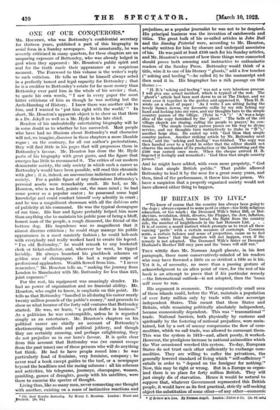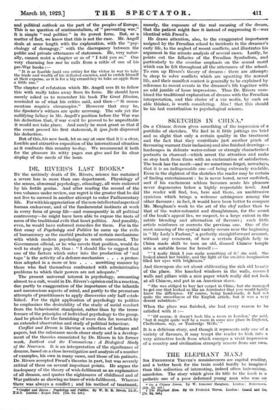IF BRITAIN IS TO LIVE.*
"We know of course that the country has always been going to the does; always exposed to some peril or other—too little religious education, or too much ; the Deceased Wife's Sister Bill, or Bol- shevism, revolution, drink, divorce, the Flapper, the Jew, inflation, deflation, white bread, brown bread, the flight from the country side, the number of knighthoods in the last Honours List. . . . It is of course a sound instinct which prompts us to treat all these varying ' perils ' with a certain measure of contempt. Common sense, a certain balance and sense of proportion, cause 1113 to feel 'in our bones' that the disasters will not happen, even if the remedy is not adopted. The Deceased Wife's Sister or Deceased Husband's Brother Bill may pass and the 'buses will still run."
Thus wittily does Mr. Norman Angell placate, in his first paragraph, those more conservatively-minded of his readers who may have frowned a little on so strident a title as is his.
Yet it is, of necessity, no more than a passing gesture of acknowledgment to an alien point of view, for the rest of his
book is an attempt to prove that if his particular remedy —the International outlook—is not adopted, then the 'buses will cease to run.
His argument is economic. The comparatively small area of these islands could, before the War, maintain a population of over forty million only by trade with other sovereign independent States. This meant that these States and Britain, while remaining politically absolutely independent, became economically dependent. This was " transnational " trade. National barriers, both physically by customs and spiritually by the fostering of national prejudices, were main- tained, but by a sort of uneasy compromise the flow of com- modities, which we call trade, was allowed to surmount them. This was the system in 1913—and, albeit poorly, it worked. However, the prodigious increase in national animosities which the War occasioned wrecked this system. To-day, European States do not trust each other sufficiently to exchange com- modities. They are willing to suffer the privations, the
generally lowered standard of living which " self-sufficiency " entails in order to "depend on the foreigner for nothing" Now, this may be right or wrong. But in a Europe so organ- ized there is no place for forty million British. They will just simply die of starvation. Hence it would be natural to suppose that, whatever Government represented this British people, it would have as its first practical, strictly self-seeking object the substitution of some other—of any other—economic • If Britain is to Live. By Nunn= Angell, London : Nisbet & Co. [2s. 65. zeta
and political outlook on the part of the peoples of Europe. This is no question of sentimentalism, of "preventing war," it is simple "real politics" in its purest form. But, as a matter of fact, we know that this is not the case. Mr. Angell
deals at some length with the explanation, with the "psy- chology of demagogy," with the discrepancy between the
public and private utterances of statesmen. He, very natur-
ally, cannot resist a chapter or so of "I told you so." One very charming bon mot he culls from a critic of one of his
pre-War books :—
"It is as feasible (said one critic) for the victor in war to take the trade and wealth of his defeated enemies, and to enrich himself at their expense, as it is for a big errand-boy to take an apple from a little one."
The chapter of refutation which Mr. Angell sees fit to follow this with really takes away from its force. He should have
merely asked us to remember his book The Great Illusion, reminded us of what his critics said, and then—" Si monu- mentum requiris circumspice." However that may be, the Spectator's withers are quite unwrung. The sole yet the
nullifying fallacy in Mr. Angell's position before the War was his deduction that, if war could be proved to be unprofitable
it would not take place. And surely he must grant us that if the event proved his first statement, it ipso facto disproved
his deduction.
But of this, his new book, let us say at once that it is a clear, forcible and attractive exposition of the international situation as it confronts this country to-day. We recommend it both for the pleasure its witty pages can give and for its clear display of the needs of the hour.











































 Previous page
Previous page